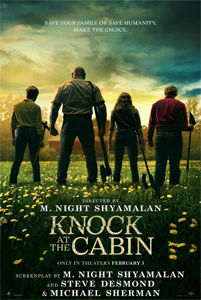I suspect “Knock at the Cabin” (Peacock) will rank as M. Night Shyamalan’s most divisive film. Based on the novel “The Cabin at the End of the World” (2018) by Paul G. Tremblay, it features many core Shyamalan themes. Here, the director/co-writer explores broad spirituality, the methods by which one person (or group) can shape another’s beliefs, and the notion that the truth can only be found beneath the surface.
You gotta have faith – or do you?
As second-grade teacher Leonard, Dave Bautista (“Guardians of the Galaxy”) gives the type of huggable-big-dude performance that we can’t help but sympathize with. But as big as the former wrestler’s shoulders are, he can’t carry material that’s intellectually bombastic, bizarre and ultimately boring.
I haven’t read Tremblay’s book, but if Shyamalan and co-writers Steve Desmond and Michael Sherman adapted it faithfully, then it’s built upon an unappealing message.
“Knock at the Cabin” (2023)
Director: M. Night Shyamalan
Writers: M. Night Shyamalan, Steve Desmond and Michael Sherman; based on Paul G. Tremblay’s novel
Stars: Dave Bautista, Jonathan Groff, Ben Aldridge
It’s not bad enough to knock “The Last Airbender” from the bottom spot among Night’s catalog. It’s closer to “The Lady in the Water,” but that film is more interesting to think about because Shyamalan’s world-building is gonzo and personal.
“Knock” is Tremblay’s much simpler case of world-building (or world-destroying, as it were), borrowing from actual religions. Shyamalan shoots it well, in a woodsy cabin with an evocative wall full of books. Gay couple Eric (Jonathan Groff) and Andrew (Ben Aldridge) and their 8-year-old daughter Wen (Kristen Cui) are staying there when the titular knock occurs.
(SPOILERS FOLLOW.)
Thought experiment (Spoilers)
“Knock at the Cabin” ultimately makes a case in favor of the four politely home-invading crazies and against rationality, and that’s why I dislike it. Until the ending, I held out hope for one of those famous Shyamalan twists. “Knock” calls to mind his own “The Village,” where things aren’t what they seem, and the movie version of Stephen King’s “The Mist,” with its narrow, personal focus amid what could be an apocalypse or could be nothing at all.
The earnest Leonard makes us want to believe he’s truthful, even though his message about impending doom isn’t appealing. He’s joined by three others – Rupert Grint (the Shyamalan-produced “Servant”) and a pair of women – wielding medieval weapons. The Four Horseman of the Apocalypse parallel is so on the nose you’ll hope a character doesn’t verbalize it (but they do).

It might’ve been fun to pick out clues as to whether Leonard’s group is truthful or full of crap. But that’s not the focus. Instead, the subtle through-line is one husband’s fear that the other will buy into the Horsemen’s tale of doom and their proposed way out. If the family agrees to sacrifice one member (either Eric, Andrew or Wen), then the world will be saved.
I can’t knock “Knock” as a thought experiment. It’s an artificial one, propped up by quality technical filmmaking and good acting, but interesting in the abstract: Would you kill a loved one to save humanity? The husbands’ off-the-bat answer is thanks but no, thanks.
I would’ve answered the same way, and Leonard’s group says nothing to convince me otherwise; indeed, they never make a case that can’t be written off as coincidence or scheming.
A long journey to the end (Spoilers)
Whether you believe in a God that demands random periodic sacrifices or not, you still have to ask yourself the moral question of whether you would kill. And whether the survival of the many outweighs the survival of one. Do numbers change the morality of an action?
I disagree with the husbands’ change of mind at the end, and therefore the film’s decision to laud an emotionally manipulative brand of religion (although I suppose this is an off-brand, not lining up directly with any major modern faith).
Even as I willingly waded through the buildup, hoping for that Twist, I wondered if Shyamalan was padding out the run time. He flashes back to Eric’s and Andrew’s rather standard life as a put-upon gay couple and peppers in an adoption-by-trickery scheme that would never fly. The single setting, talkiness and disheartening subject make for a long 100 minutes.
Even amid the (false) suggestion that something more is coming, “Knock at the Cabin” is mediocre as a story. Curiosity about this often-great filmmaker’s latest project got me to answer the door, but I’d have been better off pretending I wasn’t home.

